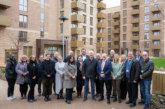Hyperoptic, the UK’s hyperfast broadband provider, announces that it has partnered with Sero, Cardiff Council and Wates Residential to pilot a new proof of concept solution to support smart home equipment.
On the Aspen Grove development on the site of the former Eastern high school on Newport Road, part of the Council’s flagship Cardiff Living housing development scheme with Wates Residential, each property will be connected with a second low-bandwidth line, which will be dedicated to support Sero’s smart equipment and will be inaccessible by the resident for internet access.
Hyperoptic will also install its standard residential fibre solution, which will allow residents to subscribe to a Hyperoptic service. The lines will be completely separate, so that the secondary line will be completely dedicated to keeping Sero’s smart home technology operating at all times.
This new solution removes the reliance on a resident needing to rely on their home broadband connection to make external provider’s smart home technology work effectively. By running the applications on a separate line, the service can be managed completely separately by the housing or smart home technology provider.
The Aspen Grove development will deliver 214 new low-carbon properties that will take energy performance standards to a new level as all of the homes will incorporate renewable technologies and smart energy management systems to significantly reduce the energy demand on the grid, as well as helping to tackle fuel poverty by significantly reducing energy bills.
The site will include 65 new council homes, 44 of which will be Community Living flats for older people and 21 two and three-bedroom houses. A further 149 properties will be for sale on the open market, with a small number being made available through the councils FirstHomes Cardiff scheme for first time-buyers. Both council and sale housing will be built to the same energy performance standards.
Liam McAvoy, MD, Business Development, Hyperoptic: “The smart home technology market is set for huge growth, with exciting use cases that span climate control, EV charge points and remote healthcare applications. We are the first ISP to offer a bespoke secondary line that is dedicated to enabling smart home technology to work effectively. By offering this service, we are giving housing providers the reassurance and control they need to ensure that their smart home technologies can always work effectively.”
Cabinet Member for Housing and Communities at Cardiff Council, Cllr Lynda Thorne, said: “Not only is our Cardiff Living scheme at the former Eastern high site the largest development in the programme to date creating more than 200 new low-carbon homes for the city, it’s also the most innovative. Utilising state-of-the-art technologies, we are focussed on delivering homes of the future that can help reduce bills for both private residents and council tenants and minimise their carbon so it’s essential we have the infrastructure in place to support this smart technology.”
Jim McArdell, head of projects at Sero said: “Decarbonising our homes is an essential part of helping tackle the climate emergency, and future homes will be increasingly reliant on smart technology to ensure this can happen. Collaboration is key to driving forward progress, and Eastern High offers a really exciting opportunity to pilot this solution of an independent line, and we look forward to seeing the potential for this to become a standard component of the build process.”
The smart home market is undergoing huge growth. A new report from Juniper Research has found that there will be almost 13.5 billion smart home devices in active use by 2025. This represents a huge opportunity to private housing developers and social housing landlords alike.
In a recent survey of 250 decision-makers at social housing organisations, conducted by Censuswide and commissioned by Hyperoptic, over half (51%) were planning to deploy smart asset monitoring devices in the next 12 month and 49% are planning to deploy smart thermostats across their housing stock. 46% are also planning investment in assisted living technologies, 44% are planning to rollout smart fire safety devices and over a third (38%) are planning a widespread smart meter deployment.









